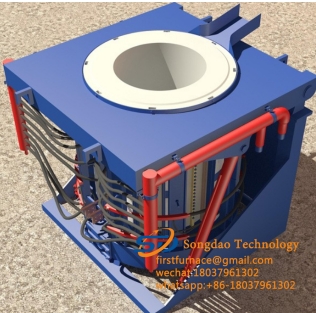- 07
- Feb
Installation and debugging of the hydraulic system of induction melting furnace
Installation and debugging of the hydraulic system of induction melting furnace
The hydraulic drive device should have the advantages of small size, flexibility and lightness, and convenient control and operation. Most प्रेरण पिघलने वाली भट्टियां use hydraulic tilting systems. The design of the oil pump station should consider reliable use and convenient maintenance. There are melting sections with multiple induction melting furnaces. The hydraulic systems of each furnace should be able to borrow each other to reduce the time of forced shutdown due to maintenance of the hydraulic system.
The fuel pump station is generally installed on a base with a certain height, which is convenient for draining oil from the fuel tank during maintenance, and at the same time, it is conducive to safe production. Even if a serious furnace leakage accident occurs, the fuel tank can be protected from molten iron. When installing oil pipelines, we must also proceed from the worst conditions, avoid encountering high-temperature iron liquid at any time to prevent the expansion of the accident.
Eliminating the oil leakage in the hydraulic system is a relatively difficult task. This starts with improving the installation quality. The joints of the oil pipeline that do not need to be disassembled should preferably be connected by welding. The weld should be dense and free of leakage. After welding, clean the inner wall without leaving welding slag and oxide scale. The oil pipeline joints with threaded connections should be sealed and leak-proof in structure. When installing, adopt corresponding auxiliary measures, such as adding anti-leakage paint, to reduce the possibility of oil leakage during operation.
After the hydraulic system is installed, the pressure test of the entire system should be carried out. The method is to pass in 1.5 times the working pressure of the oil, keep it for 15 minutes, carefully check every joint, welding and the interface of every component, if there is any leakage, measures should be taken to eliminate one by one.
After the furnace body, water cooling system, and hydraulic system are installed, the furnace body tilting test should be carried out, and the overall inspection of the furnace installation quality, such as whether the hydraulic control system is flexible and reliable, whether each action is correct; whether the furnace body and furnace cover are running Normal; When the furnace body is tilted to 95°, whether the limit switch plays a safety role, and adjusts the pressure and flow of the hydraulic system to make it in a good working condition. While tilting the furnace, check the installation quality of the movable joints of the water-cooling system. No water leaks or hinder the tilting of the furnace body; check the hoses of the hydraulic and water-cooling system, observe whether the length is appropriate when the furnace body is tilted, and make appropriate measures if necessary. Adjust; check whether the drainage system can work normally when the furnace body is tilted. If any deficiencies are found, corresponding measures should be taken. 
